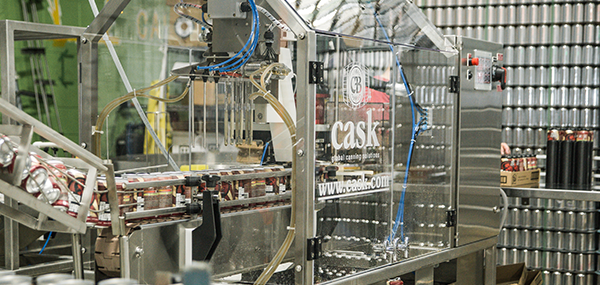During this critical time we know a lot of breweries are relying on packaged product to keep revenue coming in the door, lights on and staff paid. In many instances this means relying on mobile canners and neighbors to get beer into cans and ready to go.
Tight controls on 4 critical factors prior to canning – temperature, pressure, carbonation levels and tank-to-canning system distance – are ways breweries can maintain quality control to ensure the longest possible shelf life for their cans.
1. Temperature
Temperature of the beer in the bright tank plays an important role in maintaining low DO pickup. Beer that’s too warm (above 35.6°F/2°C) will over-foam and create product waste, whereas beer that’s too cold (below 32°F/0° C) will not create enough foam and cause the lid to sit directly on the can causing high DO pick-up. Colder beer can physically dissolve more oxygen into solution in the liquid so keeping your beer as warm as possible while still being able to control foam is key.

A proper cap-on-foam aided by tight temperature controls is key for minimizing head space, drastically reducing DO pick-up for minimal Total Packed Oxygen (TPO).
2. Pressure
Pressure will also have a significant effect on DO pickup. Too high of a head pressure will cause more turbulence in the line and excess foam, as well as cause beer entering the can to flow up the walls and break the CO2 pre-purge barrier. Too low of a head pressure will cause the beer to come out of solution and give inconsistent foaming issues. A good rule of thumb is 15 psi.
3. Carbonation
Carbonation is crucial to foam creation and needs to be consistent in maintaining standard operating procedures each batch. Anything over 3 volumes/6 grams per litre will produce excess foam, with lower carbonation levels yielding very little foam creation. Note: You will lose .1 – .3 Volumes of CO2 through the canning process.
4. Distance
Distance between brite tank and canning system influences both pressure and temperature. The further away the brite tank is from the canning machine, the lower the temperature and the more head pressure you’ll need as the beer will warm up in the lines and the pressure will drop due to friction. Anything more than a 40ft/15m brewers’ hose can lead to inconsistent filling. Cask recommends using a minimum of a 1 ½” diameter beer hose that is as short as possible, preferably right beside your brite tank.
Please note an important update: Ball Corporation is classified as a “Critical Infrastructure” sector business and will continue full-scale production of aluminum cans.
If your business or others you know are in need of cans, don’t hesitate to reach out to Cask for small-business friendly can terms.
We will get through this together, and wish everyone in our community strength and the health.
Cask provides innovative and affordable canning systems to the world’s small and medium-sized creators of craft beer, cider, wine, cold brewed coffee, kombucha and other life-enhancing beverages.
Cask is an Official Agent for the supply of aluminum cans to customers for Ball Corp, the world’s largest aluminum can producer.
Contact us if we can assist with brite or printed can supply:
Cask Global Canning Solutions #60-5100 64 Ave. SE Calgary, AB T2C 4V3
Toll Free: +1-800-661-8443
Direct: +1-403-640-4677
www.cask.com

